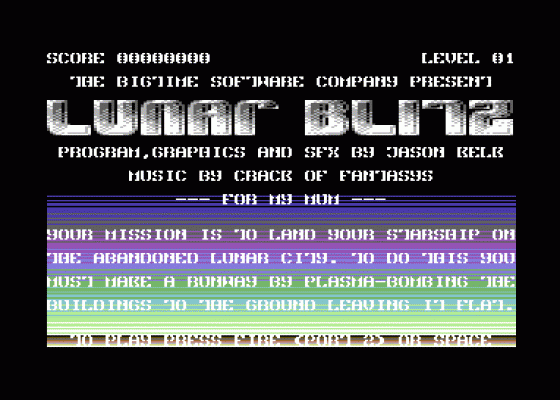
Micro Mart
 30th November 2006
30th November 2006
Categories: Retro Gaming | Interview: Developer
Author: Shaun Bebbington
Published in Micro Mart #930
This week, Shaun tracks down 6502 guru Jason Kelk and talks to him about 8-bit homebrew programming
Retro Mart: Return Of The Bedroom Programmer
When you think of homebrew programming, you'd be forgiven if you've not heard of Jason Kelk, although he has been a programmer for many years now. Better known by his demo scene name T.M.R (The Magic Roundabout), Jason's earliest works date back to 1987, although his programming expeditions started, like almost everyone else, with BASIC.
As Jason recalls, "Probably my first decent production was my first real Commodore 64 game [Co-Axis, 1989]. I had loads of prior experience with game logic and so forth from working in BASIC on the Commodore VIC 20, and at that point had just started picking up 6502 assembly language. When I got the C64, I tried to write the classic one ship, one bullet and six aliens styled shoot-'em up. Co-Axis was the third 'generation' of the first game I tried to create, and was an attempt to make something that would be commercial quality. It almost was really, as long as the quality was the lower end of the budget market, Mastertronic or Atlantis for instance.
Jason's interests don't just begin and end with the C64 though. Last Christmas, Jason released his puzzle game Reaxion onto the Atari 8-bit and Commodore Plus/4, and currently has it in the works for the Nintendo Entertainment System. He's also joined the ranks as an Atari 2600 coder with the unfinished game Block Copy. Apart from a life of coding, Jason follows the homebrew scene very closely. "I'm the site administrator for Oldschool Gaming (OSG), which lives over at www.oldschool-gaming.com."
This site, though sporadically updated, puts new games through their paces with a team of ardent reviewers. "There's always something interesting going on out there and it's just a matter of knowing where to look; the Internet has made talking about these [8 and 16-bit] machines, learning them and programming for them far easier than it's ever been and that can only ever be a good thing. Even the bad games (and yes, there are lots produced and I've probably played most of them at some point and said as much about them) can at a push be turned into a positive by pointing at them and deciding you can do better."
Jason has great admiration not only for a good 2D game, but good coding too; "The demo scene has never stopped churning out code and, if you know what you're looking at, some of it is truly astounding", he remarked, "and talking about programmers, on the game development front, I've got huge amounts of time for the work of people like Mike Dailly (Plus/4), Jonathan Cauldwell (Sinclair ZX Spectrum), Lasse Oorni (C64), and anyone who can find the time to produce something really deep and 'meaningful' with an 8-bit these days."
Retro-styled games will always have their limits though, as Jason pointed out, "at some level it has always been about presenting the same ideas in different ways; look at GameX by Jonathan Cauldwell - that's a series of arcade and early home computing classics rolled up into a new package, and Ikaruga takes the vertical scrolling shoot-'em-up and renders it with a graphics engine we could have only dreamed of just ten years ago."
And, as if proof were needed of this, Jason's last game was Lunar Blitz for the unexpanded VIC 20, which, of course, is based on the classic City Bomber concept.
Jason's parting words are something that we can all heed - "Play more new games, load more demos and e-mail the people who wrote the things - they can never get enough feedback. Learn to code because it's honestly not the rocket science you may have previously thought it to be and, although you'll never get rich writing 8-bit games, it can be incredible fun as well as extremely satisfying when the code works." And, with that, he was off to contend with real life and to think about coding once more.
This article was converted to a web page from the following pages of Micro Mart #930.





